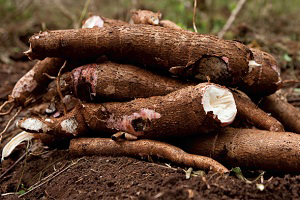Study: Cassava as animal feed in Ghana

Cassava (Manihot esculenta) is one of the main staple food crops grown by almost all farming families in Ghana, contributing to large proportion of daily calorie intake of the population.The use of cassava as a feed for ruminants and non-ruminants (poultry and pigs) in Ghana could reduce the high cost of feed and increase livestock production.
A new report Cassava as Animal Feed in Ghana: Past, Present and Future, by K. Oppong-Apane for the FAO, studies the use of cassava as animal feed in Ghana and was commisioned as part of the FAO’s inititive supporting poverty reduction in the country.
Several studies conducted in West Africa showed that cassava in its different forms has large potential as animal feed. In countries like Ghana where livestock production is largely constrained by lack of good quality feed, the availability of alternative source of feed like cassava is important.
The fact that animal feed is produced with high cost, mainly due to the elevated cost of maize, makes poultry and pig production very expensive, constituting between 60 and 75% of the total cost of production.
Due to the high cost, many farmers, particularly pig producers are shifting towards using agroindustrial by-products. Although cassava is an ideal partial substitute of maize as source of energy, livestock producers have not yet exploited this potential to the fullest.
Read the full report here.







